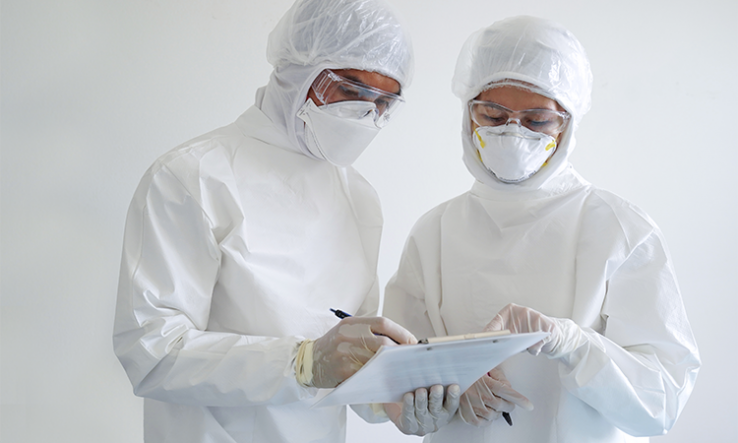
Set of joint recommendations to ensure consistent infection control across academia
The presidents of Germany’s four major non-university research organisations have called for consistent wearing of masks indoors and further hygiene precautions in order to keep students and researchers safe in winter.
In view of the colder season and growing infection counts across the country, there is little room for further relaxation, said the representatives of the Max Planck Society, Fraunhofer Society, Helmholtz Association and Leibniz Association. The institutes issued a joint statement appealing to academics’ sense of community, saying they must help to contain the coronavirus pandemic, which caused the closure of most research institutions and universities between March and June.
“If everyone contributes according to his or her ability, Covid-19 can be kept under control,” the group said.
The research organisations made their recommendations on the basis of mathematical models, which analysed different scenarios for what they called the Covid-19 winter. To avoid another shutdown, minor additional contact restrictions would be needed, in order to not exceed “tipping points”, their presidents said.
For example, people travelling to Germany from abroad should strictly adhere to quarantine rules, and all academic staff and students must continue to observe social distancing, hygiene and mask rules. Test, trace and isolate strategies should only be seen as additional tools to help contain the pandemic, the presidents said.
The statement pointed out—even though Germany now has the capacity to run 1.4 million coronavirus tests per week—this means every person in Germany is still tested less than once a year. This means that planned precautionary tests for the protection of persons at risk cannot be implemented, they warned.
The test shortage could be ameliorated by establishing efficient pooling strategies or building up existing capacities, the institutes said.
Germany’s National Academy of Sciences Leopoldina issued a separate statement, warning that the development of the coronavirus pandemic in winter would be difficult to predict or control. As the cold and flu season begins, the challenge of distinguishing diseases with similar symptoms from Covid-19 will increase, the statement said.
In contrast to the statement of the research organisations, which addressed the responsibility of the individual, the academy focused its recommendations on institutions. The academy called for effective rules for infection control in public life for the coming months. The rules should be binding and uniform nationwide.
Clear and comprehensibly communicated recommendations should also be established to help citizens comply with protective measures, the academy said. “Citizens need knowledge, motivation and the opportunity to behave accordingly, as well as clear rules,” it stated.
The Leopoldina said that proper ventilation of indoor spaces was the most important preventive measure. The academy also recommended quick and targeted tests to control the occurrence of infections.
It suggested that the current quarantine period for people exposed to the virus could be reduced from 14 to 10 days, if laboratory tests can be used to assess a person’s state of infectiousness.
The academy also placed a special emphasis on the mental health effects of the epidemic and the implemented measures.
Mental stress has increased during the pandemic, with potential long-term consequences for the health of many,” it said. Therefore, a “significant increase” in mental health for prevention and therapy would be necessary.